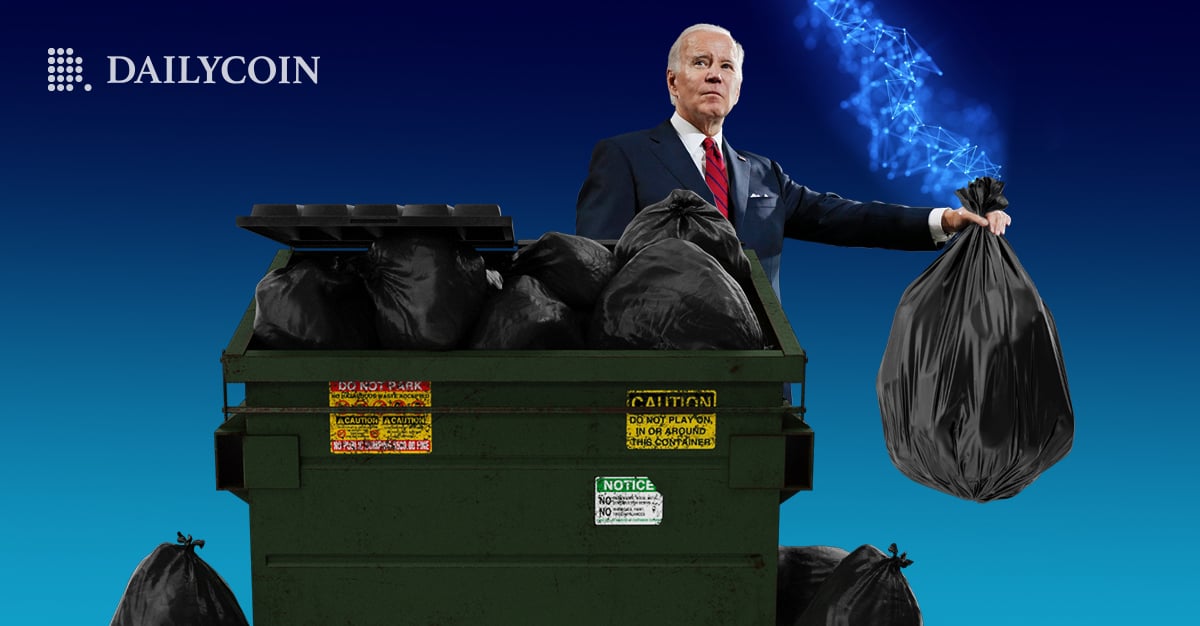
- White House economic advisors discuss the U.S. President’s fiscal priorities and policies in a new document.
- The President’s report sheds light on digital assets.
- A chapter from the study explains cryptocurrencies hold no fundamental value.
- The President’s briefing could provide guidance for taxing NFTs.
Cryptocurrency regulation has been of great importance to President Joe Biden, who has cited it as a matter of national security. The President has repeatedly pushed for swift and definitive congressional action against digital assets.
It’s likely the time for regulation is nigh, as the sector finds itself in the government’s crosshairs. In a new document, economic advisors from the White House take aim on behalf of the President, clarifying the administration’s stance on cryptocurrencies.
And things look far from favorable.
Friend or Joe?
On Monday, March 21, The White House published an annual publication titled “The Economic Report of the President,” which shed light on its fiscal plans and priorities for 2023.
The briefing comes amid growing concerns for cryptocurrencies after the collapse of banks in the country.
In a not-so-positive tone, the President’s 513-page document takes digital assets head-on with a dedicated chapter, clarifying the administration’s position on the space. The report debates several claims from the crypto industry, rebutting the asset’s role as investment vehicles, payment tools, and more.
Setting the Precedent
In its first reference to cryptocurrencies, the publication asserted:
“Blockchain technology has fueled the rise of financially innovative digital assets that have proven to be highly volatile and subject to fraud.”
The document noted several underlying issues in the sector, including the underlying design, basic principles, prevalence of scams, and more.
The President’s briefing cited various disasters in the crypto sector, including the collapse of Terra and FTX, to explain how the assets can harm “everyday Americans.” Interestingly, the report left no contagion untouched, setting the precedent that cryptocurrencies do more harm than good.
Here’s a synopsis of what the President’s report claimed:
- The underlying design of digital assets reflects ignorance of basic economic principles.
- The lack of fundamental value makes crypto assets highly volatile.
- The sector is prevalent to market manipulation, using FTX and Alameda Research as examples.
- Stablecoins are subject to running risk, alluding to the collapse of UST.
- Cryptocurrencies are ineffective as an inflation hedge, referencing their price performance in 2021 and 2022 amid rising inflation.
- The current centralized internet, Web2, is more feasible than Web3, citing Signal Founder Moxie Marlinspike.
- Real-time payment systems like FedNow and U.S. CBDC could provide greater benefits to marginalized groups.
Despite listing its concerns, the document doesn’t delve into future regulations or congressional actions, staying ambiguous in its plans. However, it adds that the underlying blockchain technology could find its way to support broader financial systems in the future.
The briefing concluded that most of the sector is regulated, and policymakers are working on bringing more companies under compliance. This document could provide additional guidance recently sought by the IRS regarding NFTs.
The IRS is Calling, and It Wants Your Feedback
In a notice published on March 21, The United States Internal Revenue Service (IRS) announced it plans to tax NFTs as collectibles. The IRS has called for feedback from the U.S. consensus on how the assets can be taxed.
According to the government agency, collectibles can’t be taxed as cryptocurrencies, referring to the capital gains tax, and need additional guidance. NFTs could be subject to a maximum capital gains tax of 28% if treated like cryptocurrencies.
However, the regulatory body has called for submissions by June 19, which means U.S. taxpayers filing their 2022 tax returns before April 18 will not be affected.
On The Flipside
- On March 20, Hong Kong set out to become a crypto-friendly nation by introducing attractive legislation for crypto businesses.
Why You Should Care
The President sets forth a definitive indictment of the cryptocurrency sector, making its stance crystal clear. It’s apparent from the document that U.S. regulators are less inclined to be crypto-forward and more interested in heavily regulating the space with legislation, taxes, and more.
Read about crypto-forward nations:
Top 12 Most Friendly Countries for Crypto Investment.
Read how TSM moved on from the FTX collapse:
TSM Signs Partnership with Web3 Project Avalanche Following Collapse of FTX Deal
- SEO Powered Content & PR Distribution. Get Amplified Today.
- Platoblockchain. Web3 Metaverse Intelligence. Knowledge Amplified. Access Here.
- Source: https://dailycoin.com/president-report-cryptocurrencies-hold-no-fundamental-value/
- :is
- 2021
- 2022
- 2023
- 9
- a
- About
- actions
- Additional
- Adds
- advisors
- After
- against
- agency
- Alameda
- Americans
- Amid
- and
- announced
- annual
- apparent
- April
- ARE
- AS
- Assets
- attractive
- Avalanche
- basic
- BE
- become
- before
- benefits
- biden
- blockchain
- blockchain technology
- body
- Briefing
- Bringing
- businesses
- by
- called
- calling
- CAN
- capital
- capital gains tax
- centralized
- Chapter
- cited
- claimed
- claims
- clear
- Collapse
- collectibles
- Companies
- compliance
- Concerns
- concluded
- Congressional
- Consensus
- Contagion
- could
- Council
- countries
- country
- crypto
- Crypto Industry
- crypto sector
- crypto-assets
- crypto-friendly
- cryptocurrencies
- cryptocurrency
- Crystal
- Current
- debates
- dedicated
- definitive
- Design
- digital
- Digital Assets
- discuss
- document
- Doesn’t
- Economic
- examples
- Explain
- Explains
- external
- far
- feasible
- fednow
- feedback
- Filing
- financial
- financial systems
- financially
- Find
- finds
- First
- Fiscal
- follow
- following
- For
- founder
- fraud
- friendly
- from
- FTX
- ftx collapse
- fundamental
- future
- Gains
- good
- Government
- great
- greater
- Group’s
- Growing
- guidance
- Have
- heavily
- hedge
- highly
- hold
- House
- How
- However
- HTTPS
- Ignorance
- importance
- in
- Inclined
- includes
- Including
- indictment
- industry
- inflation
- Inflation hedge
- innovative
- interested
- internal
- Internal Revenue Service
- Internet
- introducing
- investment
- IRS
- issues
- IT
- ITS
- itself
- Joe Biden
- jpg
- Lack
- Legislation
- light
- like
- likely
- listing
- Look
- MAKES
- Making
- Manipulation
- March
- Market
- market manipulation
- maximum
- means
- Monday
- more
- most
- nation
- National
- Nations
- Need
- New
- NFTs
- noted
- of
- on
- Paper
- Partnership
- payment
- Payment Systems
- performance
- plans
- plato
- Plato Data Intelligence
- PlatoData
- policies
- policymakers
- Precedent
- president
- president joe biden
- prevalent
- price
- principles
- project
- proven
- provide
- Publication
- published
- pushed
- recently
- reflects
- regarding
- regulated
- Regulation
- regulations
- Regulators
- regulatory
- released
- REPEATEDLY
- report
- returns
- revenue
- Rise
- rising
- Risk
- Role
- running
- s
- scams
- Section
- sector
- service
- set
- Sets
- setting
- several
- should
- Signal
- Signs
- Space
- States
- Study
- subject
- Submissions
- support
- SWIFT
- synopsis
- Systems
- Take
- takes
- tax
- Taxes
- taxpayers
- Technology
- that
- The
- The Capital
- The Future
- their
- things
- time
- titled
- to
- TONE
- tools
- true
- u.s.
- under
- underlying
- United
- United States
- value
- Vehicles
- volatile
- Way..
- Web2
- Web3
- web3 project
- What
- which
- white
- White House
- white paper
- WHO
- will
- with
- working
- Your
- zephyrnet












